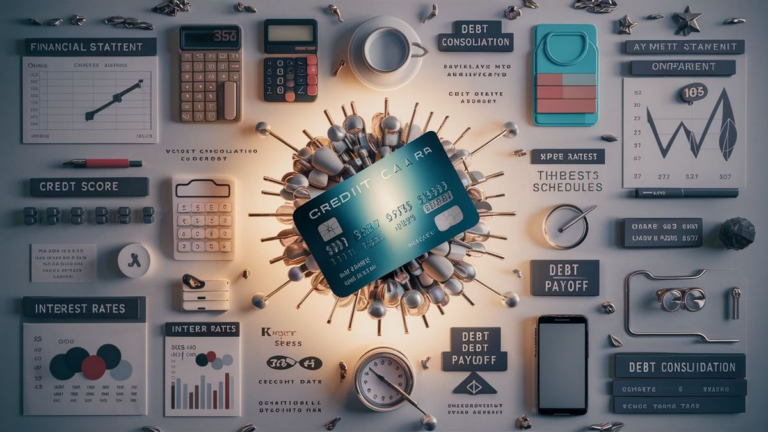Consolidating credit card debt can be a smart financial move, but it’s essential to do it in a way that won’t harm your credit score. When handled correctly, consolidation can simplify your debt repayment and potentially save you money on interest. Here, we’ll explore effective strategies to consolidate credit card debt without negatively impacting your credit.
Understand Your Options
Before diving into consolidation, it’s crucial to understand the available options. Two common methods are balance transfers and debt consolidation loans. Balance transfers involve moving high-interest debt from one or more credit cards to a new card with a lower interest rate. Debt consolidation loans are personal loans used to pay off multiple debts, leaving you with a single monthly payment.
Evaluate Your Credit Score
Consolidating debt can affect your credit score, so it’s essential to evaluate your current credit standing. If your credit score is already low, you may face challenges qualifying for favorable consolidation terms. Conversely, if your credit score is high, you’re more likely to qualify for competitive interest rates.
Choose the Right Method
Based on your credit score and financial situation, select the consolidation method that best suits your needs. Balance transfers are ideal for individuals with good credit looking to consolidate high-interest credit card debt. On the other hand, debt consolidation loans may be a better option if you have multiple debts beyond credit cards or if your credit score isn’t excellent.
Create a Repayment Plan
Consolidating debt isn’t a solution on its own; it’s crucial to accompany it with a solid repayment plan. Determine how much you can afford to pay each month towards your consolidated debt. Budgeting and cutting unnecessary expenses can free up funds to accelerate your debt repayment.
Stay Current on Payments
Once you’ve consolidated your credit card debt, it’s imperative to stay current on your payments. Late or missed payments can harm your credit score and negate the benefits of consolidation. Set up automatic payments or reminders to ensure you never miss a due date.
Avoid Closing Old Accounts
Closing old credit card accounts after consolidation can negatively impact your credit score. Length of credit history and credit utilization are essential factors in determining your score. Keeping old accounts open, even if they have a zero balance, can help maintain a healthy credit profile.
Monitor Your Credit Report
Regularly monitoring your credit report allows you to spot errors or fraudulent activity that could damage your credit. By staying vigilant, you can address any issues promptly and protect your credit score.
Seek Professional Guidance
If you’re uncertain about the best approach to consolidate your credit card debt, consider seeking professional guidance. Financial advisors or credit counselors can provide personalized advice based on your unique situation and help you navigate the consolidation process effectively.
Consolidating credit card debt can be a practical strategy for regaining control of your finances and reducing interest costs. By understanding your options, choosing the right method, and implementing a repayment plan, you can consolidate your debt without hurting your credit. Remember to stay disciplined with your payments and monitor your credit report regularly to ensure a positive outcome.
Frequently Asked Questions
Here are some frequently asked questions about consolidating credit card debt:
| Question | Answer |
|---|---|
| 1. Will consolidating credit card debt improve my credit score? | Consolidating credit card debt can potentially improve your credit score by reducing your credit utilization ratio and making it easier to manage payments. However, the impact on your score depends on various factors such as your payment history and how you manage the consolidated debt. |
| 2. Can I consolidate other types of debt besides credit card debt? | Yes, debt consolidation methods like personal loans can be used to consolidate various types of debt, including medical bills, personal loans, and more. |
| 3. How long does it take to see the benefits of consolidating credit card debt? | The timeline for seeing benefits from consolidating credit card debt can vary depending on factors such as the interest rate of the consolidation method chosen, the amount of debt consolidated, and how disciplined you are with your repayment plan. In some cases, you may start seeing benefits immediately, while in others, it may take several months to notice significant improvements. |
| 4. What happens if I miss a payment after consolidating my credit card debt? | Missing payments after consolidating credit card debt can have negative consequences, including late fees, increased interest rates, and damage to your credit score. It’s essential to stay current on your payments to avoid these issues. |
| 5. Is debt consolidation the same as debt settlement? | No, debt consolidation and debt settlement are different approaches to managing debt. Debt consolidation involves combining multiple debts into one manageable payment, often with a lower interest rate. Debt settlement, on the other hand, involves negotiating with creditors to settle debts for less than the full amount owed. |
Financial Impact
Understanding the financial impact of consolidating credit card debt is crucial. By assessing how consolidation will affect your overall financial health, including interest rates, monthly payments, and total repayment amount, you can make informed decisions about the consolidation process.
See also:






